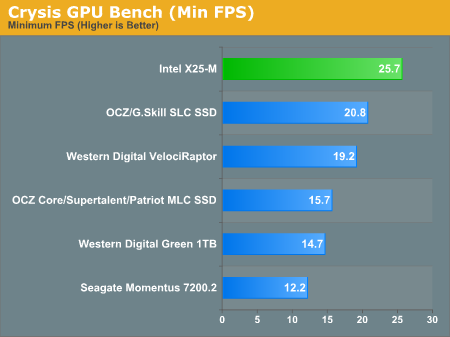now if only decently sized SSDs didn't cost $500.
My first question to the kind engineer would've been "when can I buy an intel SSD for under $300?"
Of course, my second would've been "can you give me one?"
Follow along with the video below to see how to install our site as a web app on your home screen.
Note: This feature may not be available in some browsers.
now if only decently sized SSDs didn't cost $500.
Has anyone seen some benchmarks with SSD's that focus on games?
why are people still asking questions?? hasn't the questioner already been answered?
I would be very interested to know how the Intel SSD's stack up against this badboys..
http://managedflash.com/index.htm
I recommend these for Enterprise DB's in my line of work.. since they come in under the cost of SAS/SCSI 15k drives..
Desmack.
Can't wait for these to come down in price
~AU$1200 for a 32GB X25-E in Australia
Has anyone seen some benchmarks with SSD's that focus on games?

What's the recommended particion alligment for Intel M and E series drives ?
With the report of a 1TB SSD at CES, this really looks like the year that SSDs are going to take off.
pureSilicon Debuts World's First 1TB
New OCZ Vertex SSD.
I have some questions for the SSD experts.
1) How well would 2-4 smaller SSDs in RAID0 work for scratch space in a "simulated" production environment?
2) Do they multitask well?
I have 6-10 users. When a user connects it creates a work space directory, and if they start sorting data it creates another directory for sorting. When they exit the client, the directories are deleted automatically. The normal pattern reads a large file into temp work space, then processing begins by writing many sequential temp files a RAID in scratch space that is created when they connect with the client. Files are up to 7GB in size, although there are usually many smaller intermediate files created during processing. Would SSDs be a good choice? Would an SSD have maintenance issues with this type of processing? I read that SSDs don't multitask well if there are multiple users hitting them at the same time, is this fact or fiction? My benchamarks will consist of running 2-3 processes simultaneously.
The current box has 5yr old 4x1.28Ghz Sparc III CPUs, shared LUN disk space, and I want to benchmark a single i7 920 or ~Q9550 at about 3GHz (similar speed to a 2.93GHz 5580 Xeon) to see how it would perform in comparision to the old Sun box, with dedicated drives. The current system OS is Solaris 9, new OS will likely be Redhat or Centos, perhaps 64bit Win2003 or Vista64 for initial testing. I would like to utilize the onboard ICHR10 controller for this. My second choice is using some WD 640GB drives I already have in RAID0, they're fairly fast.
We currently don't have enough work space at 55GB, looking to test with about ~160GB perhaps, either with slivers off the 640s or some smaller SSDs.
G1 has 16 MB and G2 has 32 MB
thanks. i just bought and install today my x25-m... how do i know if it is a g1 or g2?
